Because of safety concerns, full names are not used for some Syrian refugees in this article, and some names have been changed.
The garden courtyard in the center of Ahmad and Nisreen’s house in Syria opened to the sky, allowing the laughter of their children and other family members and smoke from the barbeque to waft into the neighborhood.
In her kitchen, Nisreen prepared dinners with meat each day for her nine children, using her full-size stove, complete set of cookware and running water. If she needed bread, she sent one of the children with some cash to the bakery. Feeding the family on Ahmad’s earnings was not difficult.
At least that’s how it used to be—before the fighting between Syrian government and opposition forces in their town of Hama “went crazy,” as Ahmad says. In September 2013, the family fled Syria for Beirut, Lebanon.
Our paradise
“Our house used to be our paradise,” says Nisreen, from the one-room apartment where the 11 of them now live. Their home in Syria has been destroyed. All her husband’s earnings go toward rent—$500 a month.
In one area, thin mattresses are piled next to the windows, where the children entertain themselves day after day because their father fears for their safety outside. The family has gradually collected second-hand appliances, including a stove with one working burner that Nisreen now uses to cook the rice and lentils that Ahmad buys with vouchers he gets from Popular Aid for Relief and Development (PARD), a partner that MCC supports with funding through the Canadian Foodgrains Bank.
The family is among about 1.3 million Syrian refugees, half of them children, who left their houses, schools and relatives behind when they came to Lebanon. They traded the fear of being killed for life in tents and crowded, tiny apartments, for high food prices and jobs with long hours and low wages.
And they are outsiders. Resentment is increasing among the 4.3 million Lebanese who initially welcomed their neighbors but now must compete with Syrians for jobs and suffer rents that have doubled, overcrowded classrooms and insufficient public utilities. Syrians feel the hostility.
Tension and co-operation
Since the war began, MCC has allocated $19.8 million to help meet needs in Syria and for Syrian refugees in Lebanon and Jordan. This includes support for food, shelter and peacebuilding and trauma healing efforts. In addition, MCC is helping congregations in Canada resettle eligible refugees from Middle Eastern countries experiencing conflict and urging lawmakers in the U.S. to work for peace.
In Lebanon, MCC-supported efforts, intentionally trying to relieve the burden on host communities and reduce tensions, also benefit those in need from the local community. MCC-supported trainings in peacebuilding, disaster response and trauma healing help community and church leaders to address conflict that can lead to violence.
In the Daouk area of Beirut, where many Palestinians have lived since 1948, MCC partner PARD offers a summer day camp for 75 children, ages 7 to 12, some Syrian and some Lebanese, with and without Palestinian heritage. In a day, children may prepare songs and dances for a parent program, weave bracelets, draw pictures and play games with water and balls.
For Syrian children, accustomed to learning in Arabic, the day camp, like a kindergarten MCC supports during the rest of the year, helps build the English skills needed to understand teachers in Lebanese schools.
And it was designed to build bridges among children of different backgrounds, says Naomi Enns. She and her husband Doug Enns are from Winnipeg, Man., and are MCC’s representatives for Syria and Lebanon. “We wanted all of them to experience what it’s like to be a child,” she says, “minus the boundaries that tell them to act differently because of their ethnicity.”
Increasing cooperation among Syrians and Lebanese is critical in the Bekaa Valley, so close to Syria that on any given day sounds of the fighting can be heard across the mountains.
MCC’s partner, the Lebanese Organization for Studies and Training, distributed MCC relief and hygiene kits to 800 families last summer, a quarter of them to struggling Lebanese families. In addition, MCC supported a goat-rearing pilot program, providing 10 of the neediest Lebanese families in the town of Baalbek with pregnant goats and training them in goat husbandry.
Ideally, as families increase their own financial security, they will feel less threatened by the Syrian presence. Trainings encourage cooperation among the Christian, Shia and Sunni participants.
“Tensions make us even poorer,” says Ramy Lakkis, director of the Lebanese Organization for Studies and Training. “If you need to sell milk, you shouldn’t have to limit the customers to people you agree with.”
Emotional wounds
The violence in Syria not only stresses everyone’s need for food, shelter and jobs, it has left emotional wounds on some of the most vulnerable.
When Raana, 13, and her brother, Aamil, 9, still lived in Homs, Syria, militants broke into their school and forced them to lie face-down on the floor for two hours. The next day, the family left its newly furnished four-room house and fled to Lebanon. The house was destroyed two months later.
In Beirut, they found a tin-covered room on the roof of an apartment building and eventually House of Light and Hope. This ministry of the Greek Orthodox Church and an MCC partner specializes in helping girls, in part to shelter them from the risk of economic and sexual exploitation as they try to earn money for their families.
Raana’s mother brought her daughter to House of Light and Hope for educational and social activities, but Raana would not interact. “She wouldn’t speak to any girls her age and she didn’t want to meet new people,” Raana’s mother remembers. “She shut herself away.”
A social worker started sitting with Raana every day and a psychologist worked with her to process her traumatic experiences. After about six months, Raana began to participate in social activities, her mother says, and attended extra classes in the evening to help her succeed in Lebanese schools.
“Really, without the organization, I would have been lost. They stood beside us,” says Raana’s mother, who also joined a women’s support group and will soon start job training there.
Patchwork of resources
Like Raana’s mother, piece by piece Syrian parents are stitching together a patchwork of the resources they can find to wrap around their families in the midst of this precarious situation.
MCC’s support, aimed at the most vulnerable people in areas where MCC partners were already working, offers refugees another piece to build upon—sometimes opening the door to larger changes.
In Sikkeh, an area near Lebanon’s border with Israel where many Palestinian Syrians had taken refuge, Fatima’s family spent a year living in a vacant lot of more than 80 tents, made from nylon sheets, curtains and blankets that did not withstand freezing temperatures or flooding. Scabies, hepatitis and lice were common. Diarrhea and illness were frequent dangers, and one infant died.
Working through PARD, MCC used funds from Canada’s Department of Foreign Affairs, Trade and Development to renovate rooms for 10 families, providing the springboard for other international nongovernmental organizations to prepare rooms for 50 more families, says Doug Enns.
Fatima remembers the day she, her husband and four children moved from the tent into a room in an apartment building. “People thought I was going to go crazy because I was so happy,” she says. “I was done with mice and rodents.”
“At least here we have a little dignity,” Fatima says.
“Dignity,” her husband adds, “is when a person lives in his own home. This is my own home, my children around me.”
To learn and to see how you can help, go to http://mcc.org/stories/piece-piece
—Posted Feb. 5, 2015

Girls play a game by throwing balls through a hole. MCC partner House of Light and Hope specializes in support for Syrian girls, including tutoring, activities and counseling. (Photo: Silas Crews)
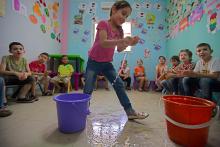
A smiling girl passes handfuls of water between two buckets surrounded by children in a summer camp. This camp offers some normalcy for refugee children, helps young Syrians learn the English skills required for education in Lebanon and brings together children of different backgrounds. (Photo: Silas Crews)
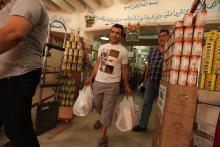
In Beirut, Ahmad and other Syrian refugees buy groceries with vouchers provided through an MCC project. (Photo: Silas Crews)
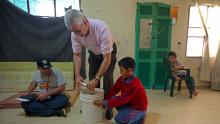
Rabi Allam, left, and Wisam Raad of MCC partner Lebanese Organization for Studies and Training deliver MCC relief kits, which are packed in useful plastic buckets, to Syrian refugees and Lebanese families in need. Since the Syrian crisis began, MCC has provided nearly 18,000 relief kits, 101,000 comforters and blankets and 64,528 hygiene kits in Syria, Lebanon and Jordan. (Photo: Silas Crews)

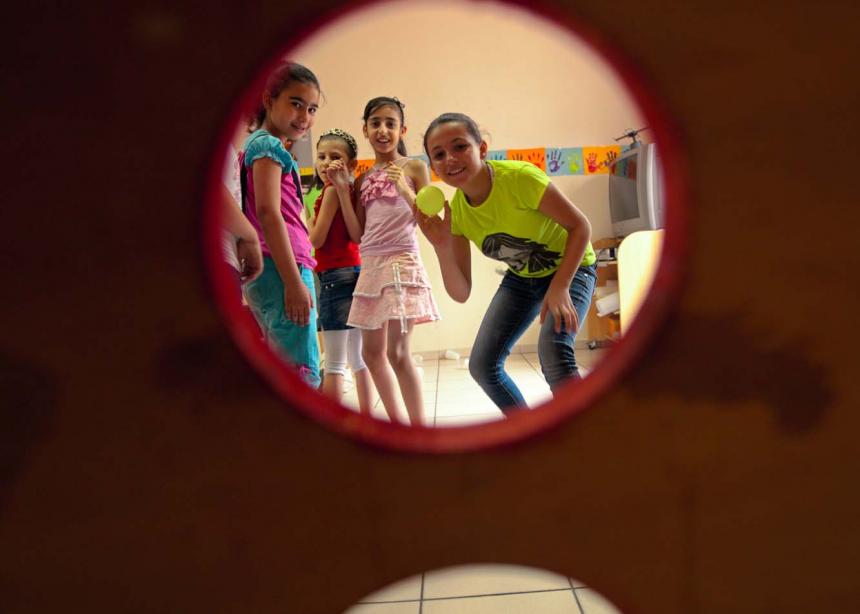
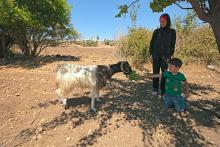
Add new comment
Canadian Mennonite invites comments and encourages constructive discussion about our content. Actual full names (first and last) are required. Comments are moderated and may be edited. They will not appear online until approved and will be posted during business hours. Some comments may be reproduced in print.